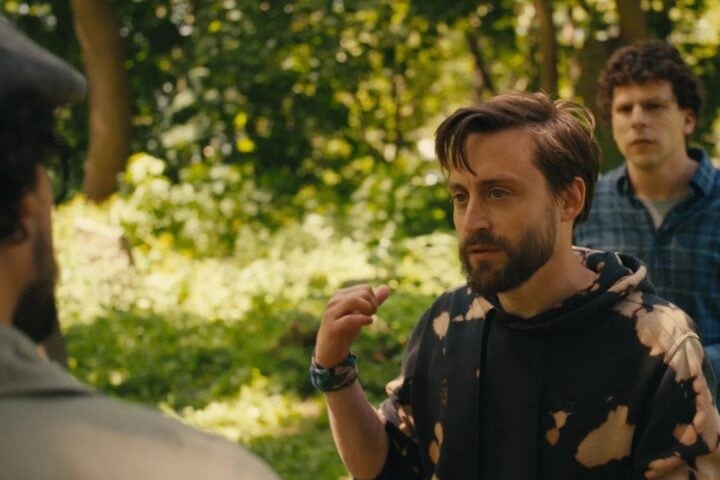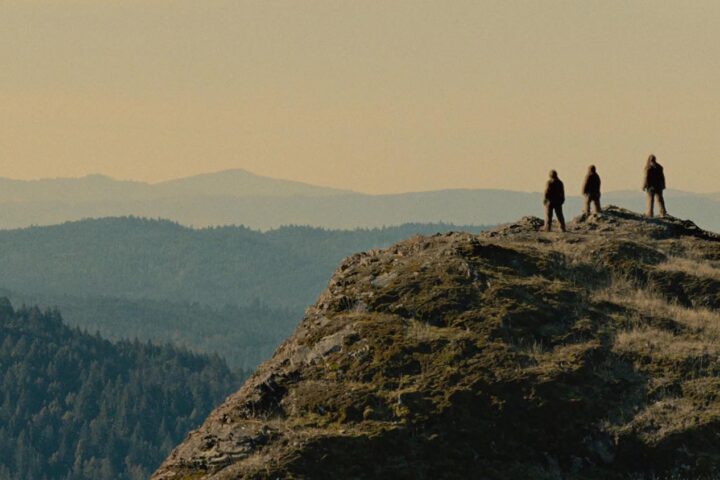There’s enough pain on display in Jesse Eisenberg’s crackling comedy A Real Pain to keep numerous therapists busy for years. It’s a cavalcade of angst and agony, from the familial to the historical, with an occasionally quite bleak assessment of the human condition. Nevertheless, it’s also levitated by a truly joyful sense of humor that puts up a good fight against the story’s darker moments without trying to joke them into irrelevance.
The film starts with David (Eisenberg), a digital ad salesman, and his cousin, Benjy (Kieran Culkin), catching a flight from New York to Poland. The ostensible reason for their trip is to visit the childhood home of their grandmother, a recently deceased Holocaust survivor. But the immediately apparent subtext to the journey is a once-brotherly bond between the two that’s withered into a cool awkwardness. They seem to want to reconnect but have no idea how. Given their positions at different extremes of the anxiety spectrum, it’s hard to imagine how they can.
David is a knotted-up reed of stammering, compulsive worry in the shape of an urban professional who can never get out of his head long enough to enjoy anything. Benjy is a sad-eyed slacker whose unease doesn’t roil inside but explodes out as attention-grabbing manias that make clear that he will be sewing chaos at every step of the trip.
It’s a well-worn dynamic: the tightly wound rule-follower exasperated by and envious of the attention attracted by their chaotically magnetic opposite. But even with Eisenberg and Culkin’s characters seeming on the surface to be so close to type that their performances could have been delivered by email, the actors still make the conflict feel vital, wrenching, funny, and volatile.
Things come to a head fast after the cousins join up with their tour group in Poland. It’s a built-in audience for Benjy. Filled with a schizophrenic craving and disdain for a crowd’s attention, Benjy acts like a standup comic as he alternately charms and repels the others with his incessant look-at-me energy. He’s endearingly fearless, whether convincing everybody to participate in a maybe offensive gag photo at a war memorial or overflowing with sweetly vulnerable love for David. He’s also set off by unseen tripwires, exploding with inexplicable fury about their sitting in a first-class train car or raging at David for not hanging out with him anymore back home.
This unpredictability ensures that David is unsure how to react. At one moment, he’s scandalized that Benjy mailed ahead a brick of weed to their hotel, and at the next they sneak out onto the hotel roof to smoke a joint. David worries about Benjy’s vulnerability yet seems too conflicted to offer him a Band-Aid. David’s emotions pour out in a surprising monologue to the tour that lays open all the darkness in his and Benjy’s relationship. This is a neat expositional moment that provides the troubling backstory for the cousins’ jitteriness. It’s also a sign that the film is less a buddy romp with an emotional core than an existential comedy whose punning title casts a quizzical eye at weighing emotional pain against generational trauma.
Eisenberg’s dryly hilarious screenplay and crisply spare direction prove a big step up after the less cogent and compassionate When You Finish Saving the World. In A Real Pain, the side players in the tour group, especially Will Sharpe’s try-hard Gentile tour guide and Kurt Egyiawan’s Rwandan Jewish convert, register as respectively comedic and earnest types, yet still carry a resounding authenticity. Though Eisenberg gives Culkin a Jack Black-sized comedic star turn, relying on him to carry much of the story’s weight on Benjy’s slumped shoulders, the film doesn’t reduce the character to a symbol for everything that David is missing in life.
In a similar vein, the Holocaust isn’t leveraged for a cheap epiphany. Eisenberg shoots a segment where the group tours the Majdanek concentration camp in the outskirts of Lublin mostly without dialogue. The brutality of the human-burning ovens, the gas chambers whose walls are still discolored by streaks of Zyklon B, and the glass display with thousands of shoes of the murdered are all shot in a clear and unadorned fashion. Afterward on the bus, Benjy slumps and sobs, the reality of the world knocking him sideways yet again.
A Real Pain isn’t a film that embraces easy answers or platitudes. Even after David reveals so much of his and Benjy’s past in a monologue to the other members of their tour group, it doesn’t seem clear how they’ll move forward. You sense that, after their trip, the two may have a better understanding of the pain they carry but that they still won’t know how to escape it.
Since 2001, we've brought you uncompromising, candid takes on the world of film, music, television, video games, theater, and more. Independently owned and operated publications like Slant have been hit hard in recent years, but we’re committed to keeping our content free and accessible—meaning no paywalls or fees.
If you like what we do, please consider subscribing to our Patreon or making a donation.




